Paula Vince's Blog: The Vince Review, page 17
September 22, 2022
Trixie Belden Series 34 - 36
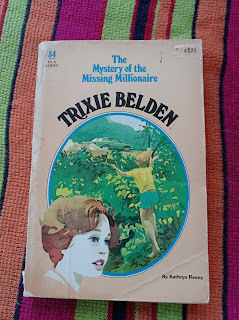 34) The Mystery of the Missing Millionaire
34) The Mystery of the Missing MillionaireTrixie and Honey discover a lost wallet near Mr Lytell's store, which turns out to belong to Anthony Ramsey, a wealthy man who owns a chain of grocery stores. He has disappeared and his daughter, Laura, is worried sick about him. She borrows money from Mr Lytell to hire a private detective, leaving her flashy car as collateral. But will the Bob Whites trump the professional, Mark McGraw, when it comes to getting to the bottom of Anthony's disappearance?
* Mr Lytell is at his cantankerous worst in this book. His caustic nature is given free reign. Trixie is terrified to even enter his shop for fear of a harsh rebuke, and sure enough, that's just what she gets. He's the sort of adult who assumes he can treat kids and teens like dirt, just because they're young. Would his snappy behaviour extend to adults? Would he bark at Peter or Helen Belden for stirring his irritation? I doubt it. A man of character would make up his mind to treat everyone who crosses his path with courtesy and composure.
* Having said that, I wouldn't say that he has no cause for being grumpy at all. Trixie finds orange, grape and cola soft drinks in his display fridge, and asks, 'Do you have any strawberry, Mr Lytell?' Perhaps she should use a bit of the deduction she prides herself on. If he did, wouldn't she expect to see a few cans out there for sale? In his place, I might fight the impulse to roll my eyes and reply, 'Does it look like it?' But I wouldn't pay her out in such a nasty manner.
* Mr Lytell does his business on an old typewriter with a slip of carbon paper between the two documents he wants copies of.
* Brian expresses his belief that Mart usually can't wait to spill all his secrets to him, but this time he's keeping quiet about whatever is exciting him. Hmm, does Brian really think that extends to everything? I suspect there's a bit of older brother naivety occurring here.
* Bobby likens Snow White's Seven Dwarfs to the Bob Whites. As well as having the same number in their group, they share a similar agenda. The Bob Whites aim to help people, just as the dwarfs helped Snow White. I like the analogy. I guess Trixie and Honey could be re-named Nosy and Tactful. And how about Muscly, Doc, Smarty, Busy and Pretty for Jim, Brian, Mart, Dan and Di respectively.
* When Laura Ramsey describes how much she loves to read, Di remarks, 'I wish I did.' And she goes on to say that she'd sooner sit in a shady spot without a book than with one. If all this is true, is she really the girl for Mart then? I get the feeling Di is misrepresented in this passage. Although she struggles with her grades in school, I never before had the impression that she hates reading in general. How about the occasional romance novel or Lucy Radcliffe book?
* Having studied an English major myself, I think Trixie's reasons for suspecting Laura's credibility are unreasonably stringent. She finds it strange that Laura, an English major at Columbia University, doesn't recognise a line from Shakespeare when she hears it. Well, I didn't recognise it either! It's far more remarkable that Mart, a fifteen-old-year High School boy, can quote from Shakespeare's Henry V off the cuff to suit the occasion, than it is that Laura Ramsey, an English major, doesn't recognise it.
* The name of Uncle Mart, who had to go into hospital for tests at the end of The Mystery at Bob White Cave pops up again. It seems he always gives his namesake Mart a subscription for a boys' magazine which he's long since outgrown. I get the impression of a clueless but well-meaning elderly relative who just goes on his merry way, and nobody wants to offend. Ah well, the magazines might suit Bobby down the track.
* We are back to Mart having a room of his own and not sharing with Brian. He retreats to do his secret business there, which would surely be impossible to hide if it was common ground for the pair of them.
* Trixie is very formal with the census taker who comes knocking. She reports that Peter is 39, Helen is 37, Brian is 17, Martin is 15, she, Beatrix is 14 and Robert is 6. She doesn't add that they've somehow plunged into a time warp, since they've all been stuck at these same ages for two or three years worth of events, haha.
* Trixie and Honey are excited about having the chance to work with a real private detective, Mark McGraw. Sadly, he's brusque and businesslike and criticises their novice methods of handling the wallet they picked up. This does nothing for Trixie's self-confidence.
* Trixie's insecurities are stirred up again. She's jealous of Laura Ramsey partly because Jim seems to be attracted to her. That lonely, vulnerable voice she sometimes grapples with demands, 'What about me?' Whenever she's in this sort of mood, proving her own importance through mystery solving seems to gain huge significance. She claims her dislike of Laura runs deeper than possessiveness over Jim, but I'm not convinced that's true.
* Mart's insecurities are stirred in this story too. Since his plight turns out to be a smaller echo of the main mystery, I'll just brush over the details, except that he's taken advantage by unscrupulous people who play on his enthusiasm and vulnerability. And his dad says that since those crooks might be more cluey than Mart when it comes to deception, he has nothing to be ashamed of.
* Trixie actually gives Mart an apology. 'I'm sorry for bursting in like that. I really am.' (Yet as she obviously isn't sorry at all, I'm not sure we can take that one.)
* All the crooks who appear in this story are class acts. Their devious activity is sneaky all round.
* A suitable quote of the book was hard to choose. The boys keep saying noble things. For example, Mart tells Trixie, 'I don't want to just go to school and study agriculture on Dad's money and then become a teacher using Jim's. I want to contribute something too.' And later Jim declares, 'I'm not going to let what someone else is change what I am. I hope I'm nice to everybody.' These are both worthy contenders.
* But the quote of the book is this exchange between Trixie and Burt, the census man, because it made me laugh. Trixie: My mother's name is Helen. She's thirty-seven. Burt: Does she work outside the home? Trixie (uncertainly): Well, she has a big garden.
35) The Mystery of the Memorial Day Fire
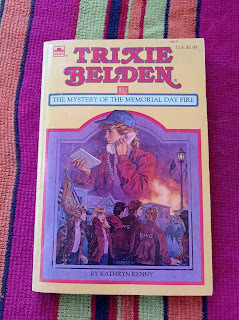
The whole of Sleepyside is out enjoying the festivities of Memorial Day evening when a deafening explosion rips through town. It was set in the basement of Mr Roberts' trophy shop and discovered to be the work of an arsonist. Poor Mr Roberts is accused of the heinous crime for the purpose of collecting insurance. But what other mischief is afoot? Is the presence of Jane Dix-Strauss, a journalist who specialises in arson, at all coincidental? Can Trixie and the Bob Whites figure out who really started the fire?
* From here on out, I've read none of these remaining books of the series. In my teens I collected and devoured the first thirty-four and went for years thinking that was it. Then suddenly in my twenties, I saw these extra ones at the bookshop which had been published in the mid eighties. I couldn't believe it! I grabbed them of course, but since I was busy with babies and other stuff, I put them aside and never got around to reading them. Until now!
* I've got to admit I started this with a bit of trepidation. After such a big gap, I had no idea how many inconsistencies might pop up. Quite early on, Regan was referred to as the Wheelers' chaffeur, which didn't augur well.
* The Bob Whites are enjoying the 117th annual Memorial Day parade together. It sounds like a pageant in which local businesses can observe the season, promoting themselves in the process.
* Jane Dix-Strauss is the newest addition to the staff at the Sleepyside Sun, keeping up the tradition started by Paul Trent of rubbing Trixie up the wrong way. She starts by snapping a surprise photo of the Bob Whites at the parade, then pokes fun at Trixie's startled reaction. That wouldn't be a problem in our era. Journalists like Jane would be required to ask subjects' permission first. No way could she simply blind subjects with her flash and then demand their personal details for her feature article.
* The sheep mentality of the crowd in the wake of the explosion disgusts the Bob Whites. People are so curious to find out what happened that they surge forward en masse, blocking the fire vehicles from getting to the scene.
* The Bob Whites have another clubhouse crisis. Urgent repairs are needed but their treasury is empty.
* Honey complains about her bad grades and says that she needs to study, or she'll have to do summer school during the holidays. Now that's an inconsistency. She's always been the smart, conscientious one. Trixie and Di are the only strugglers when it comes to school grades.
* Oh dear, Sergeant Molinson has done it again. He's jumped the gun, interrogating somebody who should be above reproach with insufficient evidence. In The Midnight Marauder it was Mart. In this instance, it's Mr Roberts.
* It doesn't ring true for me that Trixie (and others) would be able to snoop around the grounds of the explosion site a mere day or two after it happened. Surely it should be cordoned off with tape and KEEP OUT notices for safety reasons! Even back in the eighties.
* We're told the action takes place in the first week of June. In that case, Mart should have just celebrated his 16th birthday on the first day of the month. Kathryn Kenny doesn't mention it, so I thought I would. It appears he has a learner driver's permit. You need to be 16 for that where I come from, so I hoped this was an indication that time has started ticking again at last. But nope, Trixie and Honey are still apparently 14, so my theory falls flat.
* Mr Roberts comes across as his usual taciturn, uncommunicative self, although in all fairness, we only ever see him in the pages of these books when his business and family life are under great stress. Perhaps he's quite a jolly guy at other times.
* Helen Belden says, 'I think I have the four best children in the whole wide world.' Well, since the older three carry the weight of all those chores on their shoulders, she has a fair case. And Bobby, stuck in his perpetual six-year-old mindset, is still oblivious that he doesn't have a chore, he is one.
* My biggest question is where the heck was Regan the night the Wheelers' stables were set on fire?!! His personal digs are practically right on the spot. And he's always been super vigilant about his equine friends. So when an arsonist sets the stables ablaze, those beloved horses are threshing and neighing with terror, and the fire department arrives on the scene, are we meant to assume that he just sleeps through it all? No way, Jose!
* Quote of the book goes to Jim. 'Trixie has enough energy to power a locomotive, if there were only some way to harness it.'
36) The Mystery of the Antique Doll
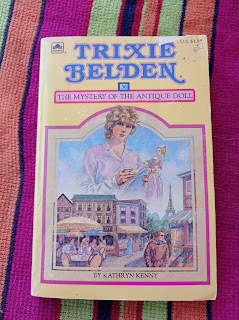 When Dr Ferris asks Trixie and Honey to do some light housework for Mrs De Keyser, they jump at the chance. She lives next door to a mysterious Antique Barn they've been anxious to check out. Its proprietor, Mr Carl Reid, seems impatient and preoccupied. But when he discovers the girls are off on a long-weekend to Paris, he asks them to pick up a special antique doll for him. The beautiful treasure causes loads of strife, especially when they return to Sleepyside. The doll disappears and Mr Reid accuses the girls of stealing her. What really happened, and are there more secrets to the doll than he is letting on?
When Dr Ferris asks Trixie and Honey to do some light housework for Mrs De Keyser, they jump at the chance. She lives next door to a mysterious Antique Barn they've been anxious to check out. Its proprietor, Mr Carl Reid, seems impatient and preoccupied. But when he discovers the girls are off on a long-weekend to Paris, he asks them to pick up a special antique doll for him. The beautiful treasure causes loads of strife, especially when they return to Sleepyside. The doll disappears and Mr Reid accuses the girls of stealing her. What really happened, and are there more secrets to the doll than he is letting on? * We're told that Dan is the only Bob White who doesn't attend Sleepyside Junior Senior High School. Huh, since when? He has always been there with them before, and we never heard he'd stopped. In fact, I'd assume he'd have to be there still, if he aims to be a New York City cop. Surely you need to graduate from school to get into police academy. Kathryn Kenny, more information please.
* Dr Ferris asks Trixie and Honey if they'd mind doing some light housework after school some nights for Mrs De Keyser, who has fallen over and broken her arm. They're happy to, since she lives next door to the new antique barn they've been anxious to check out. In fact it's her property, and she's Mr Reid's landlord.
* Mrs De Keyser teaches the girls to make a terrific stew which sounds like it could rival Mr Maypenny's legendary stew, the way they rave on about it. I'd like both recipes in my dream series cookbook, of course.
* She has a mischievous dog named Willy who seems to be even more of a handful than Reddy. For at least Reddy doesn't attempt to bolt from the door the moment he sees an opening.
* Trixie originally thinks Mr Reid, the proprietor of the antique barn, seems a bit fishy because he obviously knows zilch about the antique business. Her father tells her that in his line of work, he sees people who know nothing about their products go into business all the time. But come on Pete, do they really know absolutely nothing, as this guy seems to?
* This story takes place the week after Halloween. If we are splitting hairs then, Brian should have just turned nineteen by now. Just saying. (Of course he's no doubt still seventeen in Bob White time.)
* Trixie and Honey are finalists in the regional spelling bee. It gives them quite a bit of stress.
* The narrator tells us that although Mart is the smartest of all the Belden children, he has a lot of trouble with spelling. Hmm, that's a bit of a blanket statement for something that's highly relative. How about Brian? While Mart is clearly our most creative humanities and literary guy, Brian always takes first place in mathematics and science. And arguably their sister may surpass them both with sixth sense and intuition. ('I don't think up things that are fishy, Honey Wheeler. I only notice them.')
* Jim, Brian and Mart will be taking over cooking for Mrs De Keyser while Trixie and Honey are in Paris, and the two girls wonder if they can even cook. Honey says (sort of disparagingly, I think) 'Jim is actually a pretty good cook. There's no reason why Brian and Mart can't learn something useful too.' Then Trixie agrees, 'You're absolutely right. This will be a broadening experience for them.' That's a bit of a continuity glitch, since the boys are actually excellent cooks. Way back in Mystery in Arizona, they were the only ones Maria the chef would trust to take over her kitchen when she got ready to go AWOL. In fact at the time, she groomed Brian, Mart and Jim to roll out top quality cuisine on demand.
* Trixie's not above a bit of boasting to Mr Reid, who rubs her up the wrong way. 'We happen to be flying to Paris in Mr Wheeler's private jet, Mr Reid,' as she holds her nose at a lofty angle. Well, la-di-da, Miss Belden. I doubt her parents would approve of her boastful behaviour. Oh well, it comes back to bite her, when he asks them to do him a special favour.
* This story introduces a stereotypical bumbling detective, Marcel Patou from Paris. With his awkward, fumbling fingers, I don't know how he ever made it as far as he did.
* (Slight spoiler alert) Bobby's role in the disappearance of you-know-what is unbelievably far-fetched to me. We're expected to believe that little Willy, a dog he's never seen before, carries it all the way from his own house to Crabapple Farm, where he's never been! What are the odds?
* Quote of the book goes to Mrs De Keyser. 'When you get to be my age, an antique is just something that used to be brand new when you were young.' (Her comment is ironic since my set of Trixie Beldens were brand new books when I bought them in my teens, and now I've seen some appear on the shelves of antique shops themselves.)
Catch up on Series 31 to 33
Stay tuned for 37 - Finish
September 15, 2022
The Borrowers Series (Books 1 & 2)
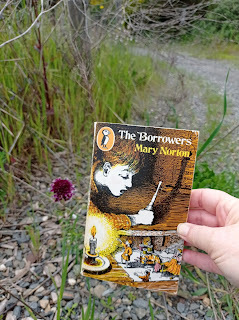
1) The Borrowers
'We are part of the House. You might as well say the fire-grate steals coal from the coal scuttle... Human beans are for Borrowers, as bread is for butter.'
This beautiful series begins when elderly Mrs May tells her young friend Kate the long but logical tale of why small household objects inexplicably disappear. They are pilfered by a hidden race of tiny people, of course, who can put them to good use. She re-tells her younger brother's story about his brief run-in with such a family, decades earlier.
They lived beneath the floorboards of a stately British manor. There was a father, methodical Pod, the most skillful borrower of his generation, and a mother, houseproud Homily, who created a cosy home from odd scraps he'd managed to glean over the years. Their only child was Arrietty, a restless sprite of a girl who pined for the great outdoors and company her own age. But the tragedy of their niece Eggletina's demise at the claws of a cat makes Pod and Homily inclined to keep their precious daughter close. In fact traditionally girls don't 'borrow' at all. They stay home doing household chores while boys are taught to go out with their dads and learn the family survival skills. Arrietty finds that hard to swallow.
This is one of those kids' books which is even more richly nuanced for adults. There are some gorgeous details, such as their memories of the snooty Overmantel family, who are now nowhere. In fact Homily retains a detailed social strata in her head, even though all of the other minuscule families have long since packed up and moved on, for various reasons. I love how the 'human bean' cook, Mrs Driver, and gardener, Crampfurl, surreptitiously sneak their employer's bottles of Fine Old Pale Madeira, because they trust she'll never venture downstairs and catch them red-handed. And how Pod has befriended the invalid Great Aunt Sophy herself, because he knows she never believes what she sees after her third glass.
Life changes when a nine-year-old boy (Mrs May's brother) arrives for a stay in the countryside with his great aunt, and spies the borrowers when they are taken off guard. He commences an unlikely kindred spirit relationship with Arrietty which triggers her great epiphany. Arrietty had assumed that the existence of too many giant people would take a fatal toll on the world's resources, but learns that her concept of the world had been far too limited. Of course eventual danger from the human adults is inevitable, since the boy's very presence sets everyone's predictable lifestyles off kilter.
There is always a whimsical suspension of disbelief. We are invited by Mrs May to consider this tale a secret history rather than a fantasy, even though her brother was a tease with a brilliant imagination. It makes cool reading, as Arrietty discovers the world doesn't really revolve around little folk like themselves, as she'd always been taught. Meanwhile, Pod deplores the sudden gift of ostentatious luxuries without any real point, and Homily's weakness for grandiosity proves to be her downfall.
There is a lovely, slightly melancholic tone provided by the passing of time that I appreciate too. I'm ready to move straight on to the next book. C. S. Lewis said, 'No book is worth reading at ten that is not worth reading even more at 50,' and he is quite right.
2) The Borrowers Afield
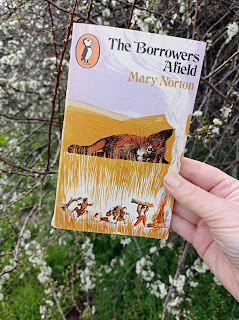
'What if it were only a story, so long as it was a good story? Keep your sense of wonder, child, and don't be so literal. And anything we haven't experienced for ourselves sounds like a story.'
Mrs May and Kate provide the framework of this tale again. When Mrs May inherits a small cottage at Leighton Buzzard, Kate goes along with her to do some sleuthing regarding the borrowers. She meets Tom Goodenough, an elderly tenant who was once the gamekeeper's young grandson. He was also the boy with the ferret who visited the day Firbank Hall was fumigated. To Kate's delight, Tom is able to continue the tale of the little Clock family where Mrs May's brother left off, for he became the next human friend of Arrietty, who told him, 'It's so awful and sad to belong to a race which no sane person believes in.'
This is a survival tale in the great outdoors.We all know Pod, Homily and Arrietty were forced to flee their home beneath the floorboards at Firbank Hall because their cover had been busted. 'Migration' is their only option, so they seek Uncle Hendreary's badger's set in Perkin's Beck, the nearby field; a tremendous trek for them. But Hendreary's home proves to be elusive, bitter winter is approaching, and the discovery of an abandoned boot appears to be a godsend. It's a modest temporary home but they have no other choice. Pod identifies it as a gentleman's boot which mollifies Homily. She might be living in some old boot, but at least it didn't belong to riff raff (as far as she knows, but the truth will out!). I love and admire these little dudes for their gumption, ingenuity and resourcefulness.
The highlight of this story is the introduction of Spiller, the scruffy urchin lad who helps himself to a few of their tools while they're out. Spiller represents everything Homily feared about living outdoors. 'Uncouth, unwashed, dishonest and ill-bred,' is how she describes him, for you don't 'borrow' from other borrowers. He's a product of a life spent alone in the wilderness, having brought himself up. (For any readers of Wuthering Heights, this borrower boy has strong Hareton Earnshaw vibes.) Yet the very qualities Homily deplores are those which provide his edge, enabling him to camouflage excellently and develop his field-smarts. By the end, they all benefit hugely from Spiller's acquaintance, which extends to saving their lives. He's a legend who is always in his element.
It's quite intriguing, as Arrietty wonders if enterprise and curiosity will always meet with disaster, for she seems to have both in spades. She wonders if it will really be necessary to keep a lid on it all forever. Poor Homily has her fair share of Children of Israel moments, and feels tempted to turn around and go home to Firbank Hall where she knows Mrs Driver will now be ever alert, but Pod reminds her that burning one's bridges is part of a borrower's philosophy. It's fun to see Homily adapt to the more rudimentary lifestyle to the extent of tucking into Spiller's hot meat, being super cautious not to ask him what it is!
There is some superb nature writing from Arrietty's delightfully limited viewpoint. Yet as this book ends, her prospects appear as grimly safe as they were beneath the floor at Firbank. She's holed up again, this time in a high, narrow wall as part of an extended family, which we already sense will become strained before long. Arrietty pines for Spiller, and I don't blame her. Something will have to give, which will be the focus of the next few books. Bring them on!
Stay tuned for Books 3 & 4 (Borrowers Afloat and Aloft)
🌟🌟🌟🌟🌟 (for both books)
September 8, 2022
'The Story Girl' by Lucy Maud Montgomery
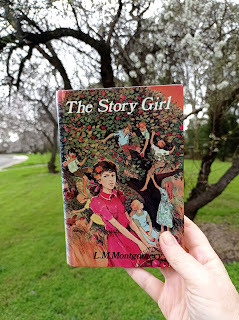
Sara Stanley is only fourteen, but she can weave tales that are impossible to resist. In the charming town of Carlisle, children and grown-ups alike flock from miles around to hear her spellbinding tales. And when Bev King and his younger brother Felix arrive for the summer, they, too, are captivated by the Story Girl. Whether she's leading them on exciting misadventure or narrating timeless stories--from the scary "Tale of the Family Ghost" to the fanciful "How Kissing Was Discovered" to the bittersweet "The Blue Chest of Rachel Ward"--the Story Girl has her audience hanging on every word.
MY THOUGHTS:
Pure nostalgia can be beautifully compelling. This is a tale of eight youngsters between the ages of 11 and 14 who hang out together in a breathtaking part of Prince Edward Island. A grown man named Beverley King narrates the story of how he and his brother Felix were sent to stay for an indeterminate length of time with relatives at the family homestead where their dad was brought up many years earlier. It's clearly one of the best times of his life, and he describes their shenanigans, fun and occasional angst as if he were back on the spot, adding occasional comments from his older self about how naive, credulous but essentially merry they all were.
Bev and Felix already possess a great sense of home from the moment of their arrival, since their father has described the folklore and features of the ancestral stamping ground to them. I love their deep sense of rootedness, and the idea that a long, quirky lineage on the same patch of land has helped shape them into the boys they already are. Not everyone is so grounded, and it's a true blessing.
They live under the same roof with their cousins; pragmatic, irreverent Dan, beautiful and conventional Felicity and gentle Cecily. A stone's throw away lives another cousin, Sara Stanley (the Story Girl) who has a fascinating gift of the gab. Rounding off their little gang is the hired boy Peter Craig, who is inquisitive and hard-working, and Sara Ray, whose controlling mother makes her wistful and anxious. The adventures and personality clashes of such a disparate group are great fun to read about.
The Story Girl gains Beverley's fascination at the outset. She has a genius for sniffing out ripping yarns from modest raw material that comes to her from everywhere. These leads slide past others as ordinary and mundane until Sara gets hold of them and forms them into her own personal style of live theatre. She has excellent recall, a great appreciation of the power of words, and quick wits to come up with a perfect story for any occasion. We readers have to take Bev's word (and Montgomery's) about how spellbinding she is, since we only get to read Sara's words without hearing them. I tend to think Montgomery (and Bev) gilds the lily a bit about her magical voice, but it doesn't detract much from the overall enjoyment of the book.
I had my own memories about how refreshingly funny the collective incidents are, but it struck me this time how many of them zoom in on those curly aspects of theology that stump seasoned adults. Lots of this book is about the little gang genuinely trying to figure out how the Big Guy Upstairs works and hoping to second guess him. For example, they deal with intense fright following some fanatic's Doomsday announcement, purchase a supposed photo of God from a boy at school, hold a preaching competition between the boys, who aim to nail the 'best' delivery, try to figure out whether or not Peter has the 'right' to pray against Felix, and wonder how they can coerce God to heal poor Paddy, even though he's just a cat. The bottom line is they really want to know how they can be truly reverential when they feel they are just winging it.
Added to all this are the trials of poor Peter, who is one of my favourite characters. He's the working class son of a single mother. And he's a genuine spiritual seeker who puts up with plenty of snobbery and flak when he decides to join his friends and start attending the local Presbyterian church. In spite of all the strokes against him, including time constraints, Peter is the one member of their little group who aims to read the Bible from cover to cover and succeeds, although he admits lots of it baffles him.
I think the fact that they are able to pin down no concrete answers but find themselves having to rely on faith and general revelations of the bounty they see around them is evidence of their growing up. And of course we readers must acknowledge that we share the same limitations as the King kids. Learning to live content with the mystery is a point we all must reach. The ages of all the main characters make this book dynamic, since they're all moving into adolescence and have their feet in two different stages of being, so to speak.
Overall, it's a lovely reminder that existential questions are natural, but it's ultimately okay that we don't get clear answers. I might even go so far as to recommend this as a fun, highly entertaining text theology students might enjoying pondering, even though it is essentially a feel-good novel. I'm looking forward to continuing on with The Golden Road.
🌟🌟🌟🌟½
September 1, 2022
Trixie Belden Series 31 - 33
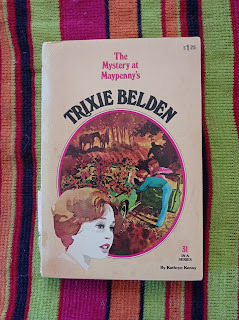
31) The Mystery at Maypenny's
Anger erupts from all corners of Sleepyside as the International Pine furniture company plans to expand their operation with land purchased from the Wheelers' game preserve. It becomes a highly flammable issue when supporters of industry go head to head with diehard environmentalists. The Bob Whites themselves are not immune from the tension. Meanwhile an estranged nephew touches base with Mr Maypenny, and poor ducks are mysteriously dying in the game preserve. How will it all pan out?
* Oh dear, we heard some ominous rumblings about the International Pine furniture company way back in The Mystery of the Missing Heiress. Now it's the name on every Sleepyside resident's lips. International Pine bought a slab of cleared swampland for their factory, and now they want even more. The parcel of land they have their eye on belongs to Matthew Wheeler's game preserve, with a fraction of Mr Maypenny's family inheritance thrown in. While Matthew Wheeler is all for the developer's plans, Maypenny won't hear a bar of it. These two are furious at each other, while others claim to see both sides.
* The heated feelings soon spreads throughout town, as the whole community will be impacted. While some people are rejoicing because International Pine will offer 200 new jobs for local residents, orhers believe the cost to local endangered species and potential pollution will be too high a price to pay.
* A passionate young environmentalist named John Score has driven all the way from Ohio with his beat-up car full of pamphlets, on behalf of Mother Earth. He's trying to get all residents to sign a petition to stop International Pine.
* The Beldens all claim to be neutral fence sitters on the International Pine controversy. They supposedly see both sides so clearly, all they can do is wait to see what happens. Mart's five point summary of the sticky situation gets the thumbs up from his dad. 'Point One: People need jobs. Point Two: Animals and plants need land. Point Three: These two are sometimes mutually exclusive. Point Four: It's a very emotional issue. Point Five: There are going to be a lot more quarrels before this issue is settled.'
* If we're splitting hairs, are all the Beldens as impartial as they seem? Helen refuses to sign John Score's petition to protect the slab of land under threat. I'm sure Score might use that to deduce that she's indirectly taking the factory developer's side. It's easy for passionate zealots like himself to conclude that not committing is in effect offering support to the opposition.
* Brian makes a huge stand when he joins his debate team on the affirmative side. (In favour of letting International Pine go right ahead.) He says he merely wants all the information to get a fair hearing, and already knows the negative speakers are thorough and talented enough to do well for that side. But he's treading on committed ground. Can he really be, 'as much on the fence as ever' after spending all the hours putting together his speech?
* Apparently Trixie's favourite novel of all time is Mark Twain's Huckleberry Finn. She never tires of reading it. Funny she never mentioned that during Mystery on the Mississippi when the Bob Whites got a chance to visit Hannibal, Mark Twain's own country immortalised in his novels.
* Mart's hair is said to be cropped, again, yet he'd let it turn curly from as far back as Mystery of the Queen's Necklace. Has he gone back to his old buzz cut again, or just a scissor trim this time? Or did this KK simply forget that he'd resolved to let it curl?
* Jim and Dan have uncomfortably set up their banners on opposite sides of the fence. The Bob Whites make a pact to keep quiet about the inflammatory topic, yet now conversation between the seven of them feels stilted and awkward. There is always a huge elephant in the room. Brian argued that letting International Pine go ahead would be preserving Sleepyside's way of life? Think again, Brian. It seems even close friendships suffer, and they've hardly even started.
* Poor Dan's head space seems to be an interesting, teeming place of turmoil during this book. He's too reticent to say much, but we readers sense loyalty to Mr Maypenny, hurt that the old man has kept him at arm's length, and strange ambivalence toward the long lost nephew, David Maypenny.
* This book makes the interesting point that both sides of the raging argument draw from current events to support their own views. When ducks begin dying, industrialists suggest that it's not much of a game preserve to protect, while environmentalists feel certain the poor birds are merely the first casualties of what has already been started.
* This book subtly urges readers to consider which side we might swing towards. Even though studies of the environmental impact of industrialisation had started back in 1980, when this book was published, I can't help thinking more recent twenty-first century research might make this a more clear cut issue than it was then. Forty years ago, nothing much was known about Global Warming. Even in 1980, it seems a glib promise from International Pine, that they can confine their pollution strictly to the land they're purchasing. Personally, I'd probably be taking a stand with Mr Maypenny and signing John Score's petition. We are inhabiting the only earth we'll ever have, and once those rare species have gone extinct, we'll never get them back again.
* Trixie and Honey half expect to find a corpse in an abandoned car. And I get the distinct feeling that Trixie is slightly disappointed not to! We readers aren't surprised, of course. The rest of the series has set no precedence for such a grisly discovery. Phew.
* The eventual solution to the whole International Pine fiasco seems a bit of a cop-out by Kathryn Kenny, keeping one foot of the Trixie Belden series planted firmly in happily-ever-after land. Yet having said that, it also makes perfect sense. Perhaps we make 'real life' harder than it needs to be.
* Peter Belden has some wise counsel for his kids, as always. 'Remember, the people who have their minds made up are always the loudest.' But the quote of the book is undoubtedly from Mr Maypenny. 'I'm sorry Jim, I plain forgot that Matt Wheeler was your father. You kids are so nice and reasonable that it just doesn't seem possible.'
32) The Mystery of the Whispering Witch
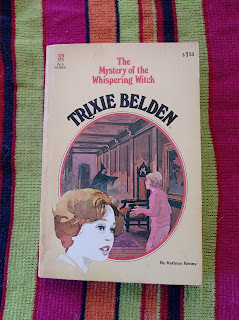
This could well be the spookiest book of the series. Trixie and Honey offer to stay overnight with Fay Franklin, an anxious school friend who lives in the town's 'haunted house.' The ghost, Sarah Sligo, is rumoured to be a vicious poltergeist, seeking revenge because she was burned alive in her bedroom, suspected of witchcraft. But is Sarah really still at large? If not, who is causing trouble and playing tricks? And why?
* For some reason, I found it extremely difficult to get my hands on this book in my teens. It never appeared on the rack of Trixie Belden books for sale, until one day, there it was, and I swooped on it. I remember starting it with extreme trepidation, since I was a suggestible 13-year-old and thought it might give me nightmares. I was frightened of ghosts and witches, and Sarah Sligo, the focus of this story, was said to be both at once. What a recipe for the jitters.
* Rumour has it that Sarah Sligo was incinerated to death on her own birthday. Whoa, that's rough. And what's more, local legend has it that a person who dies on the day of her birth is doomed to haunt the scene forevermore. And she wears the traditional, stereotypical witch's outfit; black pointed hat and flowing cape. Ultra-creepy.
* On the very night the spooky happenings start, Mart has been telling Bobby a bedtime story about Sarah Sligo, her haunted house, and the little boys who she turns into frogs that go, 'Ribbet, ribbet.' Trixie is furious with Mart for telling such a hair raising tale, but Bobby laps it up.
* Sensationalism runs high from the start. The story goes that with her dying breath, Sarah Sligo cursed future residents of her house. That's pretty unfair of her, in my opinion! They aren't the culprits who trooped to her residence, locked her in and burned her alive. Talk about misplaced vengeance. (If she didn't want to attract attention, maybe she should have worn different clothes.)
* Fay Franklin and her mother have been living there as caretakers. When Mrs Franklin falls and breaks her hip, Trixie and Honey offer to spend the night at Lisgard House with Fay. And a horror show is unleashed! What's going on?
* I wonder where Lisgard House is situated, in relation to Crabapple Farm, since the Beldens' seemed to be Fay's closest neighbours to set off on foot and ask for help.
* In their panic to shove clothes into a small suitcase for Fay before fleeing Lisgard House, the girls discover that it's full of bathing suits. How many bathing suits could Fay possibly own? It must have been a huge pile to fill a whole suitcase.
* When Trixie, Honey and Fay arrive at Crabapple Farm in the dead of night, they fling pebbles at Mart and Brian's bedroom window to wake them up. So now it appears the two boys do share a room after all. This chopping and changing between books is getting quite hilarious.
* Diana is incredibly fearless and brave a little later, at Lisgard House. She tiptoes off by herself for a curious peep in the haunted study, straight after the ghost supposedly commits hostile mischief in front of everyone. Yet in The Mystery of the Emeralds, she refuses to explore a subterranean passageway unless Mart goes with her, because of a vague tapping sound. Why the infusion of courage?
* Lewis Gregory, the current owner of Lisgard House, introduces them to Simon Hunter, a famous psychic investigator he's hired to get rid of Sarah Sligo. Hunter is a ghost buster. (According to Sleepyside fearmongers, he won't have much luck, seeing she died violently on her birthday.)
* Diana is the person who first recognises a certain lot of antiques as fakes. Even Honey doesn't twig to start off with. At first glance, this seems a bit weird, since Diana is newly rich while Honey was born to it. But perhaps not, since we know Mr Lynch is passionate about art and furniture collections, and Di herself studies art. These factors may be enough to account for her surprising penetration.
* The boys are putting together a school play for Thanksgiving. It's The Courtship of Miles Standish. Jim is Miles, Brian is John, and Mart is the stage manager. Honey teases Mart that the play has been done to death, since even kindergarten kids are cast in those roles, and he says they will add their special flair to attract Tinseltown. Well, I have to admit that as an Aussie from way across the ocean, I'd never heard of it until now. I had to google it. Many legends go international, but apparently not all of them.
* I find Fay Franklin to be one of the most poignant characters of the series. The poor girl feels certain she's possessed by an evil spirit, and can't even retreat home for respite from her worry, since her current dwelling is the source of her trouble. Yet she's not taken as seriously as she might have been if her problem didn't involve the supernatural. The boys are sceptical to the point of suspecting Fay herself of either mischief or craziness, and even Trixie and Honey don't really know what to make of her. How sad, when your legitimate worry alienates you from possible friends.
* The Bob Whites go through the motions of participating in Simon Hunter's seance. Gleeps, watch out, guys.
* Wow, Lisgard House sure has atmosphere. I got the somber vibe from the dark wood paneling and even imagined a musty odour that wasn't actually mentioned.
* The quote of the book is from Brian. When Mart wonders what the girls could've been thinking of to pack bathing suits in late November, he responds, 'Probably witches and curses and ghoulies and ghosties and things that go bump in the night.' They were indeed.
33) The Mystery of the Vanishing Victim
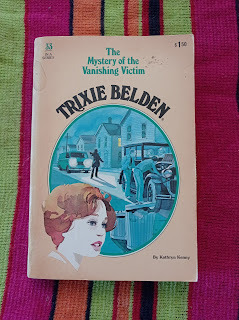
The Bob Whites receive a lovely vintage car as a donation for their rummage sale, but it breaks down in a dark and seamy district as they drive it home. A cynical stranger who helps them start it gets knocked down by a hit and run driver before their eyes. Trixie can't shake the suspicion that collision was intentional, while Sergeant Molinson digs up shady evidence about their Good Samaritan himself. Who can be trusted? And what are they to think when their victim goes AWOL from the hospital?
* The Bob Whites are preparing to host a community rummage sale to raise funds for the Sleepyside Hospital.
* Mr Burnside offers the Bob Whites a mysterious donation, provided all seven of them come to pick it up together. It turns out to be a beautiful old Model A Ford. This book, if any, is 'one for the boys.' Enthusiasts (including Brian) wax lyrical about the inner workings of antique cars. It comes as no surprise this book was written by the only male Kathryn Kenny of the bunch; Carl Henry Rathjen.
* Mr Burnside is donating his Model A to make room for his latest acquisition, a Stanley Steamer. What a super-generous gesture. Surely any rich antique car fanatic worth his salt would want to hang on to both. But he's grateful for the care he received during a long term stay at Sleepyside Hospital, so that's his contribution.
* Brian's so irritable during their breakdown that I'm not sure he's thinking straight. He starts off asking Mart to crank the engine for him, then to step out instead and shine his flashlight beneath the hood. The light is so helpful, Brian asks Trixie to take over cranking the engine, which she's reluctant to do, because her knowledge of old cars is zilch. Then Brian basically shouts at her to get a grip and just turn the key. Well, if she feels that nervous, how about letting her shine the flashlight while Mart gets back in and cranks the engine again? Duh!
* Trixie makes a novice assumption when she visits the mysterious stranger in hospital. He mentions his memory blank of the moments directly before his accident, and she assumes he must have total amnesia, as Juliana did in Mystery of the Missing Heiress. Yet it's surely clear to every reader during their conversation that he knows exactly who he is, and chooses to let her assume what she likes.
* He says, 'I had a Model A once. I bought it for $50 back when they were used cars and not antiques.' Whoa, those must have been the dark ages.
* Trixie says, 'I always thought of inventors as boring, humourless men.' (Haha, where does she get that idea from? I used to buy into the stereotype that they're wacky and eccentric.)
* We are told that the special feelings Trixie has for Jim are ones she tries to keep to herself. I'm sure he wishes she'd let them out, and is possibly unaware that she even has them. The undercurrents are strong. However, reticence seems to be no problem for Mart and Di. Without officially being called a couple, they seem to be going full steam ahead.
* The Bob Whites go canvassing in pairs: Trixie/Honey, Mart/Di, Jim/Dan and Brian and the impressive Model A. Jim and Dan were the left-over team, and Jim said that suited him fine. Secretly, I'm sure he would have rather had Trixie as his partner, but I'm glad he and Dan have put their International Pine friction from Mystery at Maypenny's behind them.
* Trixie and Honey come across some amusing characters during their door knocking collection for the rummage sale. I like Mrs Manning, the compulsive buyer of oddments who never gets around to following through on her grand plans for them. Mrs Manning tells the girls that washstands and wringers were being used not all that long ago. Ah well, I'm afraid that dates the series. I had a secondhand twin tub given to me in the early nineties, and even that felt ancient.
* They also visit Mrs Glenda Maurer, whose college daughter has decided to part with her collection of Lucy Radcliffe mysteries, because she's outgrown them. I feel like warning, 'Nooooo! You'll regret it if you do.' I once had ideas of doing the same thing with my Trixie Belden set, but I'm sooo glad I didn't. I'm enjoying them so much for this re-read project, and I'd never have been able to collect them over again.
* The biggest glitch in this story is a weird remark from Honey, that Trixie helped Mr Lytell recover his money. I'm thinking, Huh!! When did that ever happen? It turns out to be a spoiler looking ahead to Book 34, The Mystery of the Missing Millionaire. (When I made it to that book, all became clear, and I revisited this review to fix that confusion.) I'm guessing the publishers hadn't yet committed which order they would be, and when they decided to place this one first, they didn't clean up that stray remark. It's a bit sad, but since I'm taking these later books as random reminiscences rather than strict chronology, I don't mind too much.
* I think the quote of the book can be Trixie's. 'As much as I hate having Beatrix for my real name, I think it could have been a lot worse. My parents could have named me Patience.'
Catch up on Series 28 - 30
Join me next time for Series 34 - 36
August 18, 2022
'A Place to Hang the Moon' by Kate Albus
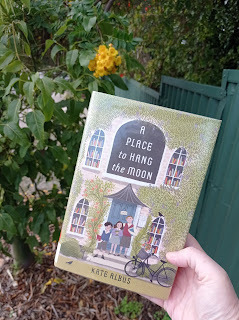
Set against the backdrop of World War II, Anna, Edmund, and William are evacuated from London to live in the countryside, bouncing from home to home in search of a permanent family.
It is 1940 and Anna, 9, Edmund, 11, and William, 12, have just lost their grandmother. Unfortunately, she left no provision for their guardianship in her will. Her solicitor comes up with a preposterous plan: he will arrange for the children to join a group of schoolchildren who are being evacuated to a village in the country, where they will live with families for the duration of the war. He also hopes that whoever takes the children on might end up willing to adopt them and become their new family--providing, of course, that the children can agree on the choice.
MY THOUGHTS:
This is the best juvenile fiction I've come across in ages.
The three Pearce kids aren't terribly upset to have lost their formidable grandmother who kept them at arm's length, but it is World War Two Britain and they are now orphans without a guardian. Their family solicitor sends them out to be billeted in the countryside to fare the best they can until they are old enough to step into their inheritance. They can only hold their breath and hope that wherever they end up, they'll be allowed to stay together.
9-year-old Anna longs for a forever home with someone who really cares, yet meanwhile she's learned the effectiveness of a good story book to help her through life's rough patches. 11-year-old Edmund, with his strong sense of justice, discovers putting up with duffers and jerks is an unpalatable sort of wisdom he's forced to swallow. And poor William, who is 12 at the start, cannot remember a time when he hasn't had to call the shots for all three of them. He just wants to pass the responsibility onto somebody who isn't winging it, but senses things are destined to get far more intense for him before they ever get easier.
Their paths cross with the Forresters, whose malevolent twin sons have the wool pulled over their parents' eyes, and Mrs Griffith, who's so worn down with the cares of daily life that she's all rough edges.
Meanwhile Nora Müller is a young village librarian who keeps her head down, because she has a suspicious sounding surname. Her German born hubby went off to check on his relatives at home and never returned. While Nora grapples with intense alienation and loneliness, she's deemed inappropriate as a guardian of billets and not even approached to board any kids from London.
It's super satisfying to see home comforts finally being lavished on the very people who are way overdue for them, matching the style of Anna's current story, A Little Princess. I guess the plot contains some predictable and conventional twists, but since they're the ones I love most, I lapped them up. Warm, nourishing food, steaming hot chocolate and piles of books can keep coming, in stories and in life. I'm sure the author, Kate Albus, winks at herself when she has Anna asks Nora, 'Why are there so many stories about orphans?' since she's just added yet another.
Overall, I think this is one the young at heart will love as much as the genuinely young, and since I read it straight through on a lazy Saturday, I must tick the bill.
🌟🌟🌟🌟🌟
August 11, 2022
Trixie Belden Series 28 - 30
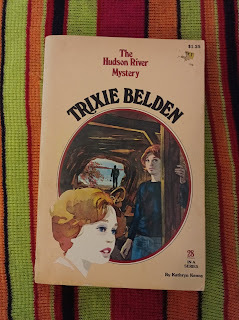
28) The Hudson River Mystery
Jaws music would create a suitable backdrop for this story. Trixie spots the impossible; a triangular shark fin gliding along the Hudson River near home. She becomes a laughingstock because saltwater fish cannot inhabit their freshwater section of the river, yet she knows what she saw. Trixie picks the brains of two experts, commercial fisherman Pat Bunker and river author Thea Van Loon, who give her contradictory feedback. Meanwhile Brian is in a serious plight. His crucial college entrance work is due soon, yet he can't shake off a feeling of sickness, despair and always feeling shattered.
* The Bob White station wagon now has three eligible drivers, since Dan has recently acquired his license, like Brian and Jim.
* Brian hangs out along the river with a girl named Loyola Kevins, who is his Chemistry lab partner at school. They are collecting water samples for an ecological survey which could have potential environmental benefit, depending on the results. Loyola is described as a 'short skinny black girl' who lives with her grandfather. Somehow, she puts me in mind of Hermione Granger. She's the same sort of brilliant, intense student.
* Mart teaches Bobby to use Spoonerisms; those verbal errors in which initial beginnings of words are swapped around. Bobby is so hooked on them, he can't get lo. (Oops, can't let go.)
* Honey is surprised and sympathetic when the author Thea Van Loon informs the two girls that there is not much money to be made writing books. She 'shakes her head in stunned disbelief.' I find myself rolling my eyes in sympathy with Thea in this instance, when she reflects that little rich girls like Honey are out of touch with the paltry salary authors earn.
* Oh gosh, the Trixie Belden books are cosy escapist reads generally, but real life intrudes for poor Brian. And the Belden family is not immune from curve balls after all. The drama plays out vividly as I read it. Brian collapsing on the floor during his birthday dinner, the paramedics carrying him out on a gurney, Peter and Helen rushing to hospital after the ambulance, Mart and Trixie barely keeping a lid on their own dread and trying to pacify terrified Bobby at the same time, and Mart dashing to the phone as soon as their mother touches base with an update. Phew, it's a rude awakening to see Brian, our favourite first aid dispenser, needing drastic medical intervention himself.
* I considered not mentioning the cause of Brian's illness. But since it has nothing to do with the main shark mystery, I'll go for it. It's one of the few incidents from the series which stuck in my mind from my teens. He has arsenic poisoning, from crunching loads of Loyola's Waldorf salad, which is packed with apple seeds. I shudder at the thought of crunching all those gritty seeds myself, as Brian must have done to have had such a terrible effect on him. Perhaps she at least pulverised them, yet it doesn't sound likely. Yucky! (Loyola's Waldorf salad won't make it into my dream Trixie Belden cookbook.)
* I appreciate the dash of black comedy, when Trixie jumps to conclusions and accuses Loyola of trying to poison Brian deliberately, since he's her most brilliant rival for the best college offers. And poor Loyola has to convince Trixie that although she's a serious and focused scholar, she wouldn't stoop to actually trying to kill her competition off.
* This story takes place in late October, so Brian's birthday, which is said to be a full week before Halloween, can be traced to October 22nd. But since Mystery on Mead's Mountain (number 22 in the series) ended with New Year's Eve, Trixie, Honey and Di should be fifteen by now, and Mart should be sixteen. Yet they're clearly not. This is why the latter books of the series must be taken as anecdotal rather than chronological. The timing is totally messed up at this point.
* Ah, the nostalgic old library days of the twentieth century. Trixie wants to look up information on sharks, and the librarian tells her to try to encyclopedias first, then the card catalogue.
* Trixie teases Mart that he's ugly and their mother reminds her that the taunt might come back to bite her, since the pair of them look alike enough to be twins. Touche.
* Trixie and Mart are roped into helping their mother can loads and loads of tomatoes. It seems Brian is now exempt to focus on his senior studies and Bobby is still too flaky to be much help. Fair enough. Middle kid power.
* I really had to laugh. Trixie is so annoying, intrusive and pesky that she drives the villain to want to kill her and Honey, just to get rid of them, a bit like swatting mosquitoes. Honestly, it's not in the baddie's best interest to dabble in murder. It's just the Trixie Belden effect to the extreme.
* It seems Mart and Brian don't share a bedroom now (even though they clearly did in Mystery of the Emeralds). Mart has been locking himself away in his room working on a secret craft project which he's keeping from everyone until the big reveal. Presumably that includes Brian.
* Four of the Bob Whites decide to wear Halloween costumes to their own little clubhouse gathering. Mart and Diana's homemade costumes make Trixie groan, but hers and Honey's are arguably even cornier.
* I love this observation about the Hudson River on the eve of the storm at the start. 'Trixie stared at it for a long moment, awed by the thought of nature transforming a joy into a threat in such a short time.' Yes, never underestimate the force of nature.
* My quote of the book is this exchange between Trixie and Brian. Trixie: Doesn't she (Loyola) seem kind of inhuman to you? Brian: No, you're the one who's striking me that way! (Haha, I love it. This bit of dialogue sums up the overall Trixie effect on many people in this book.)
29) The Mystery of the Velvet Gown
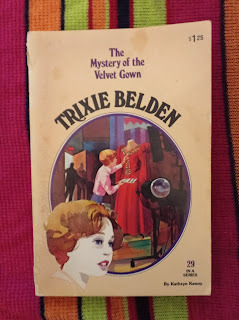
Diana gets to play the role of Juliet in the school Shakespeare play, which is a thrill for the Bob Whites, but there is some turmoil going on behind the scenes. Fellow student Jane Morgan, who badly wanted to play Juliet, resolves to make Di sorry for auditioning. Miss Darcy the drama teacher receives word that her father has been kidnapped, and she's also behaving strangely paranoid about some costumes she's borrowed for the production. Meanwhile her handsome fiance, Peter Ashbury, seems to be throwing his weight around. Can Trixie and the others get to the bottom of it all?
* One thing is clear. After weeks of working on her speaking voice, projection and poise, Di clearly did a good enough job to have earned the part of Juliet. Miss Darcy was obviously impressed enough by her audition to have given it to her. The implicit question is whether or not her physical beauty gave her an edge if it came down to a decision between her and Jane Morgan. If they were equally competent but Diana's beauty was the deciding factor, then I guess Jane has a fair case for being disgruntled. But if Diana's gorgeous appearance wasn't taken into account at all, then poor Di suffers the fate of many pretty girls throughout history. Some people are wrongfully resentful and suspicious of the victories they so rightly earn. Oh dear, they tell me it ain't easy being beautiful.
* Only Miss Darcy knows the answer to that one for sure, and of course she isn't saying. But Trixie reflects, 'Di is so pretty with her shiny black hair and violet coloured eyes, she'd make a perfect Juliet. She's just got to get the part!' Hey Trixie, surely you know all that has no bearing on whether or not Di can actually play the role.
* Diana's nerves and low confidence set in instantly, which gives Jane more ammunition. Oh, how easy for anybody to gripe, 'She only got the part because of her looks,' whether it's true or not.
* As always, the Trixie Belden novels provide some interesting background detail. We learn all about stage directions and stagecraft.
* There is a school newspaper called The Campus Clarion. Submissions aren't open to Freshman students like Trixie, Honey and Di. Jane Morgan's brother Bill is a photographer for the paper. We've never heard that Brian, Jim or Dan ever submitted anything to the paper, so presumably they didn't.
* Trixie compares Peter Ashbury to Robert Redford and Paul Newman; two very old heartthrobs who most readers probably wouldn't remember now. Either young Trixie has been roped into watching very ancient movies or she is indeed a product of a former era.
* Aww, the Bobby and Reddy moments are enough to melt soft-hearted readers like myself. Real life intrudes once again, when Reddy gets knocked over by a car and breaks his leg. But after a few days with the vet, Dr David Samet, he's allowed home, and the reunion scene is a highlight of the book.
* Brian and Mart go up to their rooms to finish their homework. Not a singular room. Just sayin'.
* Ooh, shame! The narrator refers to Miss Trask as 'the governess.' But we all know very well that Honey hasn't needed a governess for years. Miss Trask's actual current role is estate manager of the Manor House.
* Here's an interesting bit of trivia. Nowhere throughout the story was the velvet gown described as red. But those of us with the oval design cover probably assume that it is because of the picture.
* Okay, so the baddie is caught and Trixie gets most of the credit, but how does Di fare in the play? It's a fair question but we never find out. After all her stress and mental angst, the story ends weeks short of the big night. I think sometimes Kathryn Kenny forgets that Trixie isn't the only Bob White whose threads we readers are following.
* My quote of the book is from Trixie, while the girls are tossing around possible theories and Honey expresses her disbelief that anyone as handsome as Peter Ashbury could possibly be a criminal. Trixie shouts, 'What's in a name? Well, what's in a face, Honey? Good looking people can be involved in crime just as easily as anyone else.' Bravo, Trix!
30) The Mystery of the Midnight Marauder
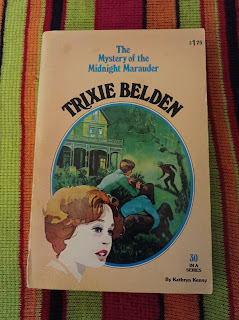
An anonymous troublemaker who signs crime scenes as 'The Midnight Marauder' is at large in Sleepyside. Poor Mart is one of the prime suspects, since he was spotted at one of the locations and refuses to reveal why. Not only is Trixie anxious to clear her brother's name, but she's burning with curiosity to find out what he was really up to. Can the Bob Whites unmask the Marauder and also help Mart out of his jam?
* Just so we're all clear, I looked up the definition of 'marauder' before beginning this book. It is, 'One who roams from place to place making attacks and raids in search of plunder.' That's exactly what the Sleepyside Midnight Marauder does. This menace steals odds and ends from each place, leaves a calling card in black spray paint and sends letters in advance, announcing the next target. The marauder's motivation for telling people beforehand is something the Bob Whites can't figure out.
* Poor Mart is high on Sergeant Molinson's list of suspects. Not only was he spotted at school the night it was vandalised and robbed, but he's been stressed and preoccupied, and even lost his legendary appetite! He won't divulge why he was on the school grounds at midnight. A couple of middle aged women are fueling the fire with their certainty that the Midnight Marauder must be a teenager, although it seems to be based on prejudice rather than actual insider's knowledge.
* I've decided not to reveal Mart's secret business which is shredding his peace of mind. If you've yet to read this book, it's best to get the total surprise factor along with the other Bob Whites. Suffice to say he suspects the nefarious marauder's nocturnal activity may be indirectly his fault.
* If the school security system was up to modern standards, I guess Mart's purpose for being there would have been on record for all to see. That's a possible factor that dates this book.
* Sergeant Molinson is a bit of a duffer in this story. It's outrageous that he should suspect Mart in the first place. I understand professionalism demands that he must follow all leads, yet surely prior knowledge of a person's character should help him avoid wild goose chases. But wait, it gets even worse. Toward the end of the book he suspects Trixie and Honey too, of being Mart's accomplices! Come on man, wake up!
* Having said that, I don't quite get why Mart refuses to tell Sergeant Molinson what he was really up to the night he was seen at the school. I'm sure Molinson would keep it close to his chest. We know Mart is embarrassed about the fix he's in and assumes some responsibility for the head space of the Marauder, but come on! Mart, would you rather be seen by the police as a floundering student who tried something he couldn't pull off, or as a vandal and thief?
* Dan and Brian are both with me on this one. At different times they both give their opinions that Mart should just tell Molinson all about it and get him off his back.
* Peter, Helen and Bobby Belden set off on a day trip, but rough weather and a freak accident holds them up for a few more days. What a crazy story awaits them when they get home!
* Mart has another problem on his mind too. He enrolled in a Journalism class at school, but Mr Zimmerman the teacher keeps judging his material unfit to publish. I suspect Mart was always due for a rude awakening. Anyone who's tried their hand at professional writing knows that short, simple words are recommended over long, complex ones. That might be tough for our favourite wordsmith to swallow, because I don't think he can help himself. Now he probably thinks he's lousy at his passion. Poor Mart.
* We get inside info about Crimper's Department Store, Sleepyside's grand old retro shop, and the family who run it. Old Grandpa Crimper is the retired owner who hates to relinquish the reins to his son, and causes his family a great deal of stress by doing whatever he jolly well feels like, includes joyrides in the car, although he's a menace to every other road user. Even though his family don't think he qualifies for residential care, he should arguably still be restrained from possibly causing a fatality. I'd consider him to be a ticking time bomb rather than a lovable, crusty old man.
* There may be a couple of minor problems with credibility. Reddy follows Mart when he heads off to await the Midnight Marauder at Crimper's, and we're expected to believe that Mart manages to keep this ebullient free spirit silent and still in an enclosed space with him for a couple of hours. Even if Reddy slept for part of the time, it was such a long wait. However the premises were empty for a great deal of that time, so perhaps whines and barks wouldn't matter so much then.
* Speaking of dogs, it appears Jim has given up on his plan to train his puppy Patch. He had such high hopes of making an obedient hound out of Patch, but it hasn't eventuated. It would seem the live wire Reddy has rubbed off on him too much.
* Diana admits that she wrote a letter to Miss Lonelyheart, the school Agony Aunt. It comes to light that it was over her sadness about not being invited to the spring dance. I find that unbelievable! Diana has always been a magnet for hopeful wannabe boyfriends, with her beauty and skillful flirting. Perhaps what she really means is that the only guy she wanted to go with hasn't asked her (which is easier to believe, since he was preoccupied with things that must not be mentioned). Since that makes more sense, it's how I'll interpret her comments.
* Dan goes behind the scenes and invites the school shy girl, Ruthie Kettner, to be his partner. Go Dan! In his unassuming way, he makes moves.
* Now for a quote of the book without giving anything away. It's from Mart. 'It's been just awful these last few weeks. I haven't had any idea what to do.' Just a bit of bait to get readers in the mood for this story.
August 4, 2022
'Dombey and Son' by Charles Dickens
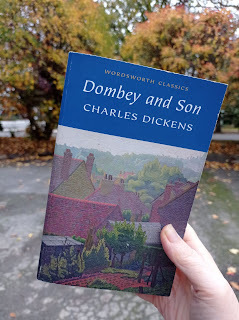
Dombey and Son, Charles Dickens’s story of a powerful man whose callous neglect of his family triggers his professional and personal downfall, showcases the author’s gift for vivid characterization and unfailingly realistic description.
MY THOUGHTS:
Whew, I aim to read all the Dickens novels, but this Victorian domestic drama about the changing fortunes of the arrogant shipping magnate, Mr Paul Dombey, was almost the end of that goal.
The beginning felt promising. I bonded with two main characters until about the 200 page mark when Dickens rips them both right out of the plot. He sends one away on a fruitless voyage and kills off the other, but by this stage, I'd progressed far enough into the story to persevere, even though I felt shortchanged. (Another reviewer commented something like, 'It's times like this when we see the "dick" in Dickens.' Strong words but fair point.)
He leaves us four other main characters to fill the slow-moving bulk of the middle section, but they're all either too unpleasant or too passive for me transfer the affection I felt for the pair he nixed.
First, of course, is Mr Paul Dombey Senior, a conceited snob who despises the general public, yet lives to impress them. He's in the position to manipulate others like puppets; employees and family alike. His petty purposes devastate several lives, yet he doesn't care. He treats his daughter like dirt and selects his second wife based on admiration of her haughty carriage, which he trusts will complement his own pomposity. Even his affection for his son is all tied up with how the boy will enable him to enhance his own image. He's rude and dismissive, basically never changes throughout the whole story, and makes decisions with the sole aim to upset people.
He breaks up other families more than once, bosses his wife around, orders his manager do his dirty work, makes his daughter a general scapegoat, breaks off friendships on a whim and expects devotion for trifles. The list goes on. Seriously, this guy is a bad egg, which makes it incredibly difficult to sympathise with the blows of misfortune he suffers, and to maintain our interest in him over 800 pages.
Second main character is Florence, his loving, young daughter. She's one of Dickens' angelic young women who can do no wrong, but I believe he stretches saintliness to a fault in her case. How Florence can keep doggedly loving a father who treats her with contempt and emotional abuse from the moment of her birth is beyond me. He sends the young man she's fond of off to sea out of pure malice, and Florence knows it full well, yet still pines for his paternal love with such devotion. Dickens writes her character with his usual sentimental hint that we should all strive to be more like Florence, which leaves a bad taste in my mouth because in this case he seems to be recommending that we glorify Stockholm Syndrome.
Sure, I understand that her hands were tied to a huge extent. It was the Victorian era, which meant Florence was essentially a prisoner in her father's house. It was not her inability to take action I objected to, but rather her unnaturally submissive attitude.
Third is the haughty and scornful Edith, Dombey's second wife, who knows she's being bought, sulkily chooses to go along with the plan, then pulls off one of the biggest passive-aggressive sulks in literature. I will say this for her though, she has a breaking point and I applaud her for never considering a bad guy to be 'good.'
The fourth main character is James Carker, Dombey's manager and right-hand man. He manipulates people's lives with the same dispassion as his employer, is an expert at subtle blackmail, and his weakness for young women of a certain appearance is his undoing.
I often had to force myself to pick up the book, since the fortunes of these four did nothing for my curiosity, especially when they faint and scream in such melodramatic ways (or at least the females do). But I hate to think I've come to the end of a Dickens novel with nothing to recommend it, so I thought I'd try to make a list. It turns out there is plenty after all, since I came up with a dozen.
1) Baby Paul's icy baptism day, which matches his father's personality.
2) Susan Nipper, a quick-witted spitfire with a great heart who loves her young lady, and doesn't hesitate to give the great man himself a piece of her mind.
3) Mrs Pipchin's establishment at Brighton, with all of its weird houseplants, and young Paul's morbid fascination with her ogress appearance.
4) The theft of young Florence's clothes by 'Good Mother Brown.'
5) Walter, that cheerful, merry-hearted lad with light-footed, light-hearted approach.
6) Carker's teeth! This gleaming white set of chompers is mentioned almost every time he appears, giving him a predatory, prowling, evil Cheshire cat vibe. Dickens really succeeded in playing on the creepiness of apparent beauty, for to Carker's Victorian peers with their chipped, missing and rotting teeth, his mouth was a masterpiece. I think those teeth are what will stick longest in my memory.
7) The final straw, when Florence runs off and subsequently makes her own decision regarding who she'll marry. High time too! And of course the fact that she actually has somewhere else to turn when her rotten father pushes her over the edge is enough to make any reader cheer.
8) Ghoulish Mrs Skewton, Edith's mother, and her quest to stay eternally young, even though every single feature is fake.
9) Kindly Captain Cuttle and his frenzied Masterchef efforts when Florence unexpectedly shows up on his door; juggling saucepans and frying pans everywhere.
10) The wonderful, contemporary illustrations by Hablot K. Browne, aka Phiz.
11) Florence's simple-hearted admirer, young Mr Toots, and his tendency to deliver one-liners that state the obvious, such as greeting Walter, who has survived a horrific shipwreck, with, 'I'm afraid you must have got very wet.'
12) Finally, the beautiful sibling bond between Florence and young Paul was really heartwarming.
Okay, so now I've talked myself out of regretting reading this dragging monster of a book, but I'm still baffled by all the 5-star reviews on Goodreads, not to mention Dickens' fellow Victorian author, W. M. Thackeray who reputedly despaired writing against, 'Such power as this.' I don't deny the novel is written with genius, yet I still struggled to get through it, in which case, according to my ranking criteria, I feel I can't quite give it three stars.
🌟🌟½
July 28, 2022
'Rose in Bloom' by Louisa May Alcott
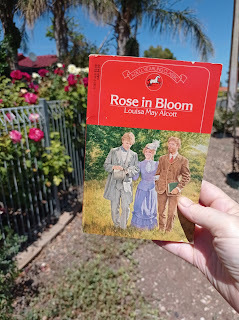
MY THOUGHTS:
I love this book. Louisa May Alcott has given us a beautiful example of the quintessential Victorian era girl in Rose Campbell, who is kind and fun-loving but can be pushed too far by the unscrupulous or overly-demanding. The circumstances that push Rose's buttons are perfect nineteenth century examples of more up-to-date situations that might similarly nettle us. And through it all she's so sweet and earnest, we can't help getting invested and barracking for her to get the appreciation (and the man!) she deserves.
I didn't have to sit and re-read it entirely within a day and a half, but I felt compelled to keep turning pages. Last read was many years ago, after all. Anyone who has read Eight Cousins might expect Rose's relationships with some of her boy cousins to evolve as they all grow older, and this is especially true of dashing Charlie and nerdy Mac. They both unwittingly help her learn what sort of man a girl should aim to spend the rest of her life with.
Charlie's chosen occupation is gentleman of leisure. He aims to have fun simply because he can, and sticks to his personal ethic, which is basically, 'Enjoy yourself to the max, because YOLO.' He loves being a society man, hitting the bottle, and basking in the admiration of others. But these things have him so firmly hooked, Charlie never gets around to finishing much else. His major project is to win Cousin Rose and her fortune for himself, and since he's the most compelling Campbell boy, he doesn't expect it'll take too long.
But Charlie's relationship with Rose is complex, because he's adept at emotional manipulation that goes along the lines of, 'I have nothing of value without your support, so if you criticize my lifestyle I'll lose the plot, and it'll be all your fault.' Has Rose learned enough relationship skills from Uncle Alec over the years to equip her for this sort of subtle blackmail from a charming young man?
On the other hand, Rose values her relaxed companionship with Mac, who seems to grow brighter and more unconventional each year. But his refreshing originality stops amusing her when it takes the form of falling in love with her too. Mac's approach is entirely different from Charlie's, because he remains mysterious about how he intends to sweep her off her feet. Wondering what he's going to do makes her edgy. Has Rose learned enough from Uncle Alec to help her handle quiet admiration from an intense young man without freaking out?
I hope I'm not making this sound like one of those hackneyed romantic triangles, because it definitely isn't. For a start, Mac would never set out to steal Rose from Charlie. He has far too much integrity for that. Nor would Charlie imagine for one minute that Mac would ever get a look in. You have to read it to see how it all pans out, and there are plot twists enough to make us laugh and cry. And you can bet Alcott really develops the characters of all three!
There's also an entertaining Archie thread keeping us cheering him on too. Some of the aunts and uncles would have loved their sober and reliable oldest boy to win Rose's heart, but little do they know that Archie has some stubborn and scandalous romantic plans in another direction! His beta romance is a great addition to the novel.
As always, my heart was touched by the great relationship between Rose and Uncle Alec. Sure, by today's standards he can be overbearing, autocratic and just plain cocky, but Rose trusts him completely and never feels there is anything she can't discuss with him. Their history is long enough that she knows full well he loves her dearly and is totally committed to her. Alec has proven many times that he has Rose's best interests at heart, and not every father-figure is such an anchor for the young women in their lives. Because of this, I call the guy a winner. Nothing she throws at him can shock him, and she knows it.
If a fraction of Alcott's inspiration for Alec came from her own fanatical dad, Bronson Alcott, then I can't help thinking he must have been a winner too.
This novel burrows to the heart of some delicate issues, through various conversations of Rose and Alec, that are often swept under the carpet. These talks are always sparked by events of the story, and include how we must adjust our attitudes to do the right thing without expecting thanks or gratitude from the entitled people we may rub shoulders with. Rose even admits feeling jealousy and discouragement, when she considers how gifted and celebrated Mac and Phebe are becoming in the public eye, while anyone could do the quiet, behind-the-scenes things she herself does. Then Uncle Alec delivers a very timely, spur of the moment pep talk on perspective which can't help hitting the sweet spot of any reader who falls short of brilliant.
The book gives us some memorable contrasts. Alcott delivers us a shocking bombshell which I wish she hadn't, but the boy Rose ends up with explains why he loves her in a very endearing manner. The nineteenth century society is described as a 'giddy vortex which keeps so many young people revolving aimlessly, till they go down or are cast upon the shore, wrecks of what they might have been.' Whoa, and they didn't even have the social media complication. Mac's prescription of, 'Keeping good company, reading good books and loving good things' is still sound advice to keep our head above water. And overall, the hallmarks of a beautiful soul are always evident.
🌟🌟🌟🌟🌟
July 21, 2022
Trixie Belden Series 25 - 27
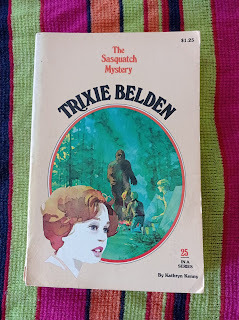
25) The Sasquatch Mystery
Sasquatch, Big Foot, Yeti, call him what you will, he's doing some scary stuff. The Bob Whites are camping in St Joe National Park with the Beldens' Idaho cousins. The mythical sasquatch is assumed to be responsible for rock throwing, theft and eerie noises. Then Cousin Cap disappears, supposedly eaten! But there are some strange, trigger happy humans around. Could any of them be behind the terror? And is Cap really gone for good?
* It's nice to see cousin Hallie Belden back in another story, this time with her older brothers Knut and Cap, who were mentioned back in The Mystery of the Uninvited Guest. Back then Hallie gave the impression that Knut was the reliable one, and Cap was a 'birdbrain.' The trio come across as vague counterparts to Brian, Mart and Trixie, but are also different in many ways. Double Belden family dynamics happening here.
* We learn that Uncle Harold Belden is a mining engineer, and he and his wife are presently off in Switzerland on a mining conference. His three kids are old enough to entertain their New York cousins and their friends on a camping holiday, yet apparently not so old that their guests aren't required to bring along their own grown-up chaperone, Miss Trask. Since I imagine Knut Belden is probably 18, it's a bit of a stretch that they even need her, yet she keeps agreeing to join the young folk on these getaways, which inevitably turn out to be hair raising. Poor Miss Trask never seems to learn.
* Trixie is sure her father would disapprove of Cap's swinging ponytail. Whoa, Peter Belden must be ultra conventional and dyed-in-the-wool! He's obviously rubbed off on his own sons too, since Brian and Mart both try awkwardly not to notice the ponytail when the cousins first meet up with each other. It seems Cap's a tad too shocking and radical for the conservative banker's boys! High time these cousins got together then, in my opinion.
* No wonder they don't see each other much, though, since Idaho and New York are right across the continent from each other. (Being an Aussie, I have to look these things up.)
* I can't help wondering if it's implicitly suggested that Uncle Harold married a woman with at least a dash of Indigenous American blood. It's just a feeling I get, from descriptions of Hallie's Pocohontas style beauty and Cap's moccasins and fringed jacket.
* Poor Dan misses out on the holiday again. No surprise there, but since it would have meant contact with Hallie again, it might have been nice if he'd got to go. After all, they developed quite a close bond in The Uninvited Guest, and were even briefly captives together.
* The cousins get along great on the whole, but unfortunately Cap gives Mart a thorough spraying for bringing a snack into their shared tent, because it could attract bears. It appears Cap's quick temper is legendary, since Trixie is about to but in but Hallie warns her to steer clear of the fracas.
* Hallie's Idaho hospitality leaves a bit to be desired too, since she frequently pays out her own tent mate, Diana, for being a scaredy cat. I'm sure many readers agree with Hallie, yet considering the bears, skunks and cougars getting up close and personal; pack rats scuttling over Di's face at night, and now park rangers going around warning campers about possible sasquatch peril, I honestly don't find Di overly reactive in this story. In fact she arguably comes across the bravest of them all, since she pushes through fear the others seem too obtuse to even feel.
* Di is very endearing during the incident when she decides to make fudge to lighten a tense campfire vigil. She's actually using a great therapeutic tool to lighten her own anxious mood, whether she knows it or not. Sometimes some hands-on activity is all it takes. (I'm sure having Mart's support boosts her satisfaction level too. A generous gesture plus enlisting help from a cute guy is surely a winning combo. It's a shame the environment let her down a bit.)
* Diana's impromptu campfire fudge will have to go into my dream series cookbook.
* There is a very thought-provoking environmental theme which comes through especially from the attitude and remarks of Cap Belden, the young woodsman. He says, 'In the time we're here, we'll have changed the whole growth schedule of all the plants we're walking on.' It's good and timely to keep that sort of consideration in mind.
* As usual, Trixie Belden books are quite educational. We get a crash course on gold panning from young Knut Belden, who obviously knows what he's talking about.
* I'm not sure I completely buy the dramatic incident when Miss Trask and Diana witness Cap's disappearance, in the presence of the 'sasquatch.' Even though Miss Trask says she tripped over and lost her focus, the whole 'now you see him, now you don't' quality doesn't quite ring true. But hey, I'm willing to go along with it for the sake of the story.
* Poor Trixie's inferiority complex is stirred up again, as she compares herself to the handsome, dark featured line of Beldens which includes her dad, Uncle Harold, Brian, Knut and Hallie, and considers herself lacking. Even though Moms is pretty, Trixie is not mad about the blonde, freckled Johnson genes she's inherited from that side. We are told, 'It was hard to think of herself as pretty, when each time she faced Mart, she saw herself.' Haha, that's clearly just a matter of personal taste. Ask Jim or Diana.
* The sasquatch puts me in mind of the trolls from the Harry Potter series. It's built like small shed, carries its own appalling stench wherever it steps and doesn't come across as super bright. Are we meant to buy into its true existence though? Kathryn Kenny invites us to believe it if it gives us a thrill of mystery! Even though a couple of the sasquatch sightings are debunked, the picture on the front cover of my oval edition seems to be presented on face value, if we wish to accept it.
* The quote of the book is from Trixie. 'The sasquatch in my imagination is a lot awfuller than the real one has been.' What a great generalisation for all sorts of scenarios life may bring our way.
26) The Mystery of the Headless Horseman
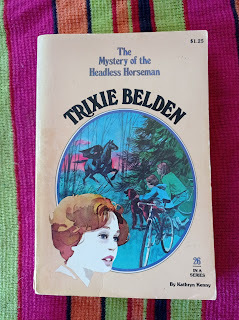
Washington Irving's legend of the Headless Horseman happened not all that far from Sleepyside. It appears the creepy phantom has migrated closer to home. Trixie and Honey spot him twice in the dead of night! Meanwhile, there's friction between Trixie and Di. Harrison the butler is acting strangely, and Trixie suspects him of theft. Nice Mr Jonathan Crandall, the former curator of the Sleepyside Art Museum, died recently under suspicion for stealing a prize Ming vase. Trixie wishes to clear his name, even if it means implicating Harrison and shaming the Lynch family. But how does the creepy headless rider fit into all this?
* Whoops, Bob White family staff have a habit of disappearing lately. Two book ago it was Regan who went AWOL from the Manor House. This time, Harrison the butler has done a bunk from the Lynch estate. The Bob Whites probably wouldn't care that much, except that he was meant to have held the fort for the Charity Bazaar on the Lynch lawns, in the absence of Mr and Mrs Lynch. Now that he's gone, it looks like it's all off.
* Luckily, not only is Harrison tracked down but Miss Trask steps up too.
* Sadly, the Bob Whites' Charity Bazaar is upstaged by the sudden arrival of a circus. Personally, I'd choose their bazaar over the 'lions, tigers and elephants' on the big roadside advert. These days, not only have traditional performing animals fallen out of favour at circuses, for their own sake, but there is generally much more lead-up to the starting day.
* To put it into a modern context, if this story was set during the twenty-twenties, Di would be blocking Trixie from all of her social media accounts. She's fed-up with Trixie's nosiness, and it's all because Trixie suspects that Harrison might be a crook. My initial reaction is, 'Huh, why the touchy protectiveness?' Surely there's no love lost between Harrison and Diana. In fact at one time, Di was eager to get rid of him because his prim and pompous presence mortifies her simple, unassuming values. So why is she taking Trixie's suspicion personally, as if Harrison is one of her nearest and dearest relatives?
* Down the track, I start to get where Di is coming from. Her loyalty to Harrison turns out to be extended loyalty to her own beloved Dad. Exposure of Harrison would mean loss of face for Mr Lynch, who trusts him implicitly. So it is a family matter after all. Fair enough, I guess.
* Mr Lynch is a serious art collector. He owns a priceless little jade statue named Tien Ling which he's lent to the Sleepyside Art Museum as an exhibit.
* Harrison's first name is never divulged. Okay, my guess is John. It would surely be something short, traditional, and totally straightforward. He's just the same as Stephens from The Remains of the Day; as proud and stately off the job as on, and even when he's seen riding a yellow pushbike. Sometimes we almost get flashes of humour from him. But not quite.
* There's a chapter entitled, 'Bob White Breakup?' The dreadful possibility of disbanding is all because of this rift between Trixie and Di. It translates to simmering discord within the Belden family too. Trixie doesn't want Mart to tell Di anything that might implicate Harrison because of this awkward tension, yet he's all, 'Hey, why should I keep any secrets from my girl?' (Not in those words of course, but that's the gist of it.)
* There are some great Reddy moments in this book. Mart acquires a dog training book and bets Trixie that he'll be able to train Reddy within a week. Naturally, Trixie is quick to take advantage of his tremendous optimism. And Reddy is such a good natured scatterbrain. How's this? 'For a moment, Reddy looked sorrowful, then remembering how much he loved them all, he sat back on his haunches and grinned.' Awww! And how about this? 'Reddy's tail, with its interesting accumulation of forest souvenirs, waved in triumph as he padded along beside them.' Such sparse sentences, yet he's right there in front of us.
* It's refreshing to get a cat character in this book too. It's fluffy, black Henry the Eighth, who belongs to Mrs Crandall. What a purring legend, who even has some impact on this story.
* Trixie refers to a Bob White adventure that was never published. As she and Honey descend into Sleepyside Hollow and see Mrs Crandall's house, she remarks, 'Don't you remember we were here once before, tracking down the lead on another mystery.' It seems Brian's jalopy broke down and Mrs Crandall let them use her phone. But that never takes place in any of the twenty-five books which proceed this one. I know, because I'm reading them all back to back. So don't scratch your heads trying to remember. That can't have been much of a mystery.
* Mr Jonathan Crandall was a keen gardener whose hobby was grafting different buds onto single fruit trees. He'd also enjoyed inventing cryptic riddles for his loved ones to solve. He was so good at it, that's part of the problem. The Bob Whites suspect a precious treasure might be hidden for safety with his wife's birthday present. But his clues have proven far too enigmatic and mystifying for discovery.
* Trixie's nose seems to be out of joint because Di is showing some initiative. When she mentions Di's unprecedented pushiness to Jim, he gently points out that it might simply seem that way because Trixie is used to running every show herself. She's miffed, to say the least, that he'd dare to insinuate any such thing.
* This exchange is good enough to be the quote of the book. Trixie: But I'm not bossy! Jim: Oh, sometimes you are. Just a little bit, maybe. But then, I guess someone's got to be the boss. Trixie: I thought we were all bosses. Jim: (wisely decides to change the subject). But she doesn't let him forget it.
* It also tickles my funny bone when Trixie reproaches him with, 'Jim, don't you ever notice anything?' I think the answer is that other than her cute curls and freckles, no, not much.
27) The Mystery of the Ghostly Galleon
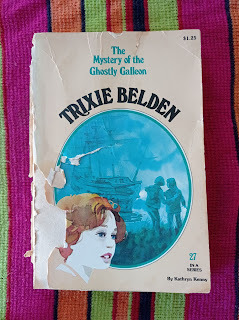
Ahoy, me hearties. The Bob Whites are spending a weekend at Miss Trask's family home; an old pirate's inn run by her brother Frank. There is an old mystery concerning a disappearing ancestor, some spooky sightings of a glowing ghost ship and a sudden calamity when Frank Trask himself goes missing. If he doesn't return in time, the whole Inn will be lost. Can Trixie and the Bob Whites help track him down?
* Hooray, the stars align for once in a blue moon, and we have all seven Bob Whites off on a holiday together at the same time. It's a quick weekend getaway. Maybe that's why Dan can spare the time.
* Since another weekend plan falls through, Mr Wheeler suggests that all the teenagers gatecrash Miss Trask's personal retreat to her own family home, at Pirate's Inn. The Bob Whites feel a bit awkward, until she convinces them that it's not only fine with her, but there's also an old mystery to solve. Then they're all on board (excuse the pun).
* It seems Miss Trask had a rascally pirate ancestor named Captain Trask, who famously vanished over lunch, the instant a group of soldiers trooped in and surrounded his table to arrest him. The mystery has never been solved.
* We're never actually told what ailed Miss Trask's and Frank's sister. Just that she's been a longtime patient at hospital and the bills are gargantuan.
* This mystery turns out to include another ghost story, or more precisely, the ghost of a ship. Whenever the Sea Fox, (Captain Trask's old galleon), is sighted in real time, it signifies that something bad is about to happen to a current member of the Trask family. And of course, Trixie and Honey see it on their first night there. I can't help thinking of all the spots of danger Miss Trask has been in over the past year, in her chaperone duties with the Bob Whites. Perhaps that ship has been flashing on and off like a Christmas light.
* Trixie is a passionate fan of a series of mystery novels about a beautiful teenage detective named Lucy Radcliffe. Whenever Mart makes fun of them, she predictably blows her top! Trixie reacts as if criticism of her beloved Lucy books is akin to slinging mud at herself. Sort of understandable maybe, since she's a teenage detective girl herself.
* She tries to fling comeback insults about his favourite sci-fi novels by Cosmo McNaught, but Mart is too cool to take the bait. It's funny that these two should get into such heated disagreements about books of all things. Sometimes Trixie is almost reduced to tears. I rarely come across such intense literary arguments in any family but mine, haha.
* Hmm, time for a few psychological observations. Once again it strikes me that Trixie often directs thoughtless digs at Mart for no reason at all, then flies off the handle when he retaliates. But because she always makes more of a kerfuffle about hurt feelings, he's put in the 'bad guy' position more often, and forced to apologise. Trixie rarely apologises to Mart for anything, even though she says some equally cutting things to him. Personally, I suspect it's just because he conceals his emotions more, as boys of the era were taught to do. She is a bit of a diva, and it works to her advantage.
* Trixie and Mart's ongoing sniping at each other is clearly intended as a counterpart to Marge and Frank Trask's thorny relationship, which has been prickling them for thirty or forty years. In more recent years, Frank has irritated his sensible sister by making a series of crazy investments. This time, he seems to have transformed their ancestral home into a pirate theme park which just verges on being tacky, but not quite. (Although some readers may argue that he does indeed cross the line.)
* I like their fellow guest Mr Appleton, a polite, unassuming little man who goes around with a lifelike dummy as his travelling companion. Does the presence of Clarence the manikin make Mr Marvin Appleton just the slightest bit weird and suspicious? Or is it each to his own?
* I also like the gloomy, fearsome looking waiter named Weasel Willis, who turns out to have a chronic case of butter fingers. But he's great at using reverse psychology to sell the best dishes on the menu. There's also an archetypal proud French chef named Gaston Gabriel, who doesn't ever bother using false modesty for convention's sake. 'I am without doubt one of the world's best chefs.' That's a confident statement to make.
* The Bob Whites sure are shortsighted during this book when it comes to making food orders. Even though many things on the menu sound terrific, all seven end up making the same order more than once. Come on guys, branch out a bit, and then you'll have the fun of tasting someone else's dish. (Not to mention it'll be especially mind-blowing if Gaston truly is one of the world's best chefs.)
* Mart and Brian share a room in the inn, and Jim and Dan share another. I'd have thought the two bros might welcome a chance away from each other and opt for a Jim/Brian and Mart/Dan pairing, but nope. This might play out in the plot when the Belden boys discover something mysterious in their room.
* It's always good when Di gets a chance to share her knowledge. She explains all about how collateral works to Trixie, who claims to be clueless. However, Trixie herself put this very same principle into operation back in The Mystery off Glen Road when she bargained with Mr Lytell to hold onto her diamond ring in return for not selling Brian's jalopy. Has she really forgotten so soon?
* The bad guy is extremely gullible. I'd like to say a bit more about how they fooled him, but I'd better not flirt with spoilers.
* The very obvious quote of the book comes from Trixie. 'My almost twin and I are alike in so many ways. Maybe that's why we're always arguing.' Is she really getting this revelation just now? The moral is reinforced when Trixie goes on to wonder whether Miss Trask also learned the lesson that 'a brother was often a pretty nice person to have around.'
Catch up on Series 22 - 24
And join me next time for Series 28 - 30
July 14, 2022
'The Unlikely Escape of Uriah Heep' by H. G. Parry
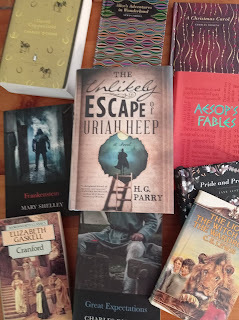
The ultimate book-lover's fantasy, featuring a young scholar with the power to bring literary characters into the world, for fans of The Magicians, Mr. Penumbra's 24-Hour Bookstore, and The Invisible Library.
For his entire life, Charley Sutherland has concealed a magical ability he can't quite control: he can bring characters from books into the real world. His older brother, Rob -- a young lawyer with a normal house, a normal fiancee, and an utterly normal life -- hopes that this strange family secret will disappear with disuse, and he will be discharged from his life's duty of protecting Charley and the real world from each other. But then, literary characters start causing trouble in their city, making threats about destroying the world... and for once, it isn't Charley's doing.
There's someone else who shares his powers. It's up to Charley and a reluctant Rob to stop them, before these characters tear apart the fabric of reality.
MY THOUGHTS:
Wow, what a treat for fans of Victorian classic literature. This fun novel is set in New Zealand.
Dr. Charley Sutherland is a 26-year-old English lecturer who finds it increasingly difficult to control his gift. All his life he's had an uncanny knack of getting so invested in novels that he causes fictional characters to materialise in the real world. Once released, some of them are determined to stay at large. Uriah Heep understandably refuses to return to the pages of David Copperfield, since he thinks every circumstance there is pitted against him in favour of the eponymous character; a privileged little sycophant in his 'umble opinion.
When Uriah makes a run for it, Charley is forced to call on the one person who has grown up helping with emergencies of this nature, his older brother Robert. But poor Rob is now a busy lawyer with a mortgage and fiance, and he just wants to lead a normal life.
It soon becomes clear to the brothers that other characters are quietly infiltrating the city of Wellington who are not of Charley's making. Another 'summoner' is bringing to life some of the classics' most infamous desperadoes to help take over the world. Charley and Rob must take drastic action to prevent this dastardly plot, but they feel so clueless and vulnerable compared to the anonymous mastermind who seems to have pilfered Charley's PhD thesis, 'Dickens' Criminal Underworld.'
The author H.G. Parry calls her novel 'a love letter to literary analysis.' She has the likes of Dorian Gray, Frankenstein, the White Witch and Heathcliff delivering their famous lines in perfect context for her story.
I expected it to be a bit spoofy based on the blurb, but the novel is so cleverly plotted, with its own twists in the spirit of the classics, it's easy to suspend disbelief while reading. What I didn't expect was to find the presence of all these well known characters together in a completely different work to be as powerfully moving as it is.
The blanket statement that fictional characters aren't real irritates me. Surely when strong, living beings exist in our collective imaginations, they've earned the right to be considered real on a different level to us. They are the brainchildren of their specific authors, but adopted by hundreds and thousands of readers willing to turn the pages and immerse ourselves in their worlds. I've spent enough time captivated by the personalities of fictional folk to make them 'real' to me. Parry is working from a similar premise which I love and appreciate.
She speaks through her own fictional detective girl, Millie Radcliffe-Dix. When Rob Sutherland tells Millie, 'No offence, but none of you are real. You're the accidental products of too much emotional investment in fiction,' she neatly responds, 'As opposed to what? The accidental products of a biological act?' Then later Charley declares, 'There's no law against a person being made of ideas, intuitions, interpretations and language.' Heck yeah, they are some of the best people I know.
According to this literary world of the Sutherland brothers, normal people may sometimes create accidental manifestations of fictional characters without even realising, when we are totally invested in their stories. If that's the case, I wouldn't be surprised to have materialised my fair share over the years then.
There is also an interesting theme about sibling dynamics and the bond between the two brothers. It turns out the dark forces want Rob on his powerful brother's side all along, because they can see that like many older siblings, he has a way of diminishing Charley's self-concept unconsciously. From their evil objective perspective, Rob makes Charley vulnerable. Being a youngest sibling myself, that struck a chord with me too. Rob is great, but Charley is such an endearing blend of brilliance and humility.
I highly recommended this for any bookworm, and it's a must-read for anyone who like me, has read heaps of Victorian fiction. After slogging our way through those tomes, we owe ourselves this as our reward. And when you get stuck into it, you'll even be wowed by several appearances from Dickens himself, under the most unpredictable circumstances. Whether he's the 'real' Charles Dickens or a typical construct from the average 21st century reader is for us to decide.
🌟🌟🌟🌟
The Vince Review
I invite you to treat this blog like a book-finder. People often ask the question, "What should I read next?" I've done it myself. I try to read widely, so hopefully you will find something that will strike a chord with you. The impressions that good books make deserve to be shared.
I read contemporary, historical and fantasy genres. You'll find plenty of Christian books, but also some good ones from the wider market. I also read a bit of non-fiction to fill that gap between fiction, when I don't want to get straight on with a new story as the characters of the last are still playing so vividly in my head. ...more
- Paula Vince's profile
- 108 followers



